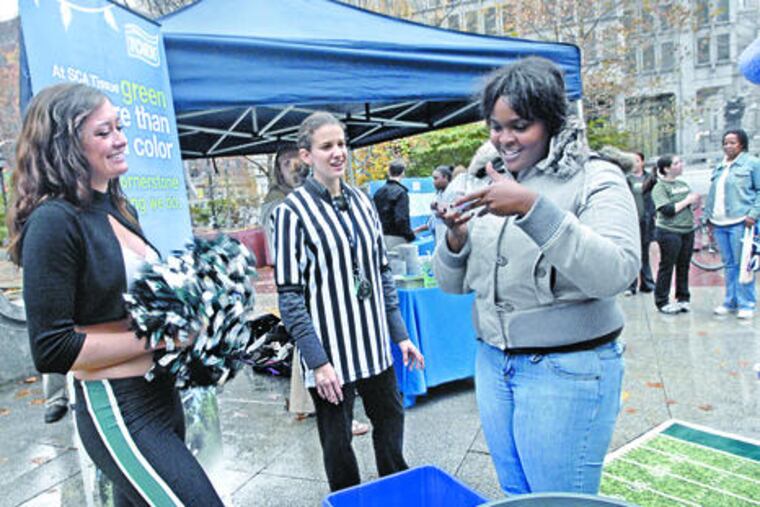Phila. arts and culture groups brace for cuts
It's been a depressing stretch for arts and cultural groups in Philadelphia. At every meeting where budget cuts come up - and in what meeting don't they? - faces are glum. Sighs are heavy.

It's been a depressing stretch for arts and cultural groups in Philadelphia. At every meeting where budget cuts come up - and in what meeting don't they? - faces are glum. Sighs are heavy.
Privately, everyone is reeling from Mayor Nutter's announcement that the national economic wreckage has hit the city hard and will result in major funding cuts.
Publicly, though?
Either brave, chin-up, soldier-on statements . . .
Or silence.
Several leaders in the arts and culture community, speaking on condition of anonymity, have said the same thing: We're unhappy, but we have to live with this mayor for the next four years, probably eight. No one wants to be heard whining and complaining because everyone wants funding restored once the crisis is over.
Several institutions are declining to comment at all.
Overall, they're stoic.
"We are going to weather this storm," said Sharon Pinkenson, executive director of the Greater Philadelphia Film Office. The office, with a $1 million budget, might have to lay off one of its eight full-time staff members, and reduce salaries and pension plans.
Like all arts groups, Pinkenson noted, the Film Office does work that helps attract tourists and create business for restaurants, shops and hotels. "We know we're not curing cancer," she said, "but what we're doing is valuable work." Last year, the office helped generate an economic boon of close to $300 million.
"We know these cuts are very painful for us and other people," Pinkenson said. "But I'm excited that there's enlightened leadership in the city, the state and nationally that understands the importance of arts and culture."
Nutter enjoys great good will in the arts community for restoring much of the funding cut during Mayor John F. Street's administration.
"Too often, when economic times are difficult, political figures look at the arts as a luxury and draw a line through it," said Viki Sand, director of the Atwater Kent Museum. "But this mayor has said art is one of the anchors of the community."
The museum has just completed creating a storage facility to conserve thousands of valuable items transferred from the Historical Society of Pennsylvania, including William Penn's wampum belt, Sand said. The city will be cutting its $50,000 contribution to the building's annual $100,000 lease. Programs and perhaps staff will be lost.
"We all need to sacrifice and pay a price," she said. The arts community seems willing to do its part, she added, because "it appears that the cuts are fair and across the board and not cutting core programs, not cutting the heart out of anything."
For many groups, the cutbacks will require intense fund-raising from the limited pool of foundations and rich donors in the area.
"You can't lose sight of what's important. The work with young people. And the community itself," said Jane Golden, director of the Mural Arts Program. "It's time for all of us to think beyond our individual needs and work together for the common good."
The city is slashing $500,000 from MAP's $2.1 million contract to provide art education and involve 3,000 children in art projects.
Golden intends to reach out to fellow arts leaders and try to collaborate, rather than fight for limited resources.
If her approach seems a bit dewy-eyed, she said, consider the combined efforts that led to the event she attended on Friday: the unveiling of the first two of 10 recycling trucks to be covered in art.
Working with the Streets Department and the Design Center at Philadelphia University, her program is decorating the city's recycling fleet in murals to promote a new curbside pickup program. One of the trucks parked at JFK Plaza last week for the official ceremony was painted with purple peacocks; the other, delicate green ferns.
The artist, Desiree Bender, worked with 60 students from four recreation centers. To complete the project, she said, "maintenance workers from the Streets Department worked overtime, without pay, because their budgets had been cut, too."
All these institutions will be competing for more money from private sources. Openly confessing need, however, can be problematic. "Success breeds success," said one arts leader. "Donors will be reluctant to give money to someone who isn't doing well."
But even the most powerful institutions have been forced to admit bad news.
The Art Museum issued a statement saying: "The severity of the current economic climate requires us to consider a range of cost-saving measures. On Friday evenings, effective Nov. 21, we will be closing all galleries on the upper floor. Galleries on the main floor, including the special exhibition galleries, will remain open. Despite our strong commitment to keeping galleries open to serve the public, we feel this is a necessary step under the circumstances."
For the Philadelphia Zoo, the budget cut is more fundamental. It will no longer have its annual $2.8 million water bill covered by the city's general fund.
Few of the city's arts and culture institutions have been spared internal turmoil as they figure out how to move forward. The Mummers, however, are in a panic, fearing that the survival of their iconic parade may be at stake.
The city plans to cut $350,000 in prize money and to bill the Mummers for the cost of police overtime - perhaps as much as $750,000 - for securing the parade route.
"They're in a desperate situation," said George Badey, spokesman for those Mummers who parade outdoors. "The parade organizers are meeting with city officials, trying to negotiate how they'll handle this year's parade. They know they're not going to get money, but they're very concerned. These cuts can have a devastating and potentially fatal effect on a tradition that has been sponsored by the city since 1901."